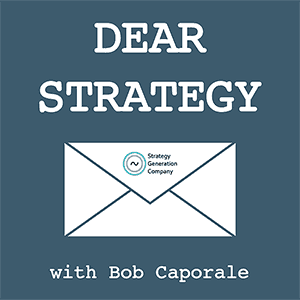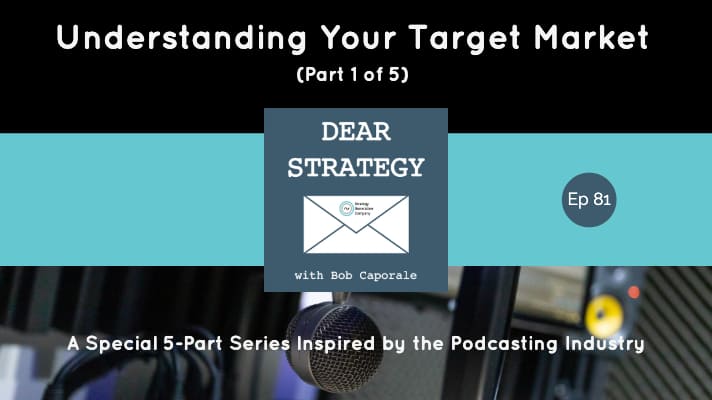NOTE: This is the first installment in a special 5-part series on Understanding the Target Market for Your Product or Business. This series was inspired by a talk that Bob gave at the Podfest Multimedia Expo in March 2019. In Part 1 of this series, we explore the following question:
Dear Strategy:
“How can I better understand the target market for my product?”
As you can see from the note above this week’s question, I’ve decided to do something a little bit different throughout the month of April. And, no, despite the first episode dropping on April 1, this is NOT an April Fool’s joke of any kind. (By the way, am I the only one who thinks that the trend of writing fake news articles on April Fool’s Day should just stop. I mean, I love a good gag as much as the next guy, but I just don’t think there’s anything particularly funny or clever about making up some ridiculous story that some portion of the population is likely to believe and spread as being true. But I digress…)
Anyway, back to the story at hand. In the beginning of March, I gave a talk at the Podfest Mutimedia Expo down in Orlando, FL. For anyone evenly remotely interested in podcasting, I highly recommend this conference. It’s a fairly large event (3 days and over 1000 attendees as of 2019), but somehow the organizers still manage to make it feel like everyone is part of one big family. It’s just a really great experience overall. In any case, the topic of my talk was something that, as any regular reader of this blog knows, is very close to my heart. That is, how to understand the target market for your podcast.
I picked this topic, by the way, because, when I went to this same conference last year, I met podcaster after podcaster with the same exact beef: They all had amazing shows (at least according to them), but they were all having trouble growing their audiences.
To put this problem into perspective, there are somewhere in the neighborhood of 650,000 active podcasts in existence as I write this article. The most popular podcasts (and there are relatively VERY few of these) have upwards of a million listeners or more. The typical show has somewhere around 100-150 listeners on average. And the magic number that many advertisers are looking for is somewhere in the 5000-listener range, which is, at least according to Libsyn (one of the premier podcasting hosts in the business), attained by only around 7% of podcasts. So, you can see how all of this equates to the vast majority of podcasters wanting to have more listeners and not knowing quite how to do it.
OK – nothing really mysterious happening here: Supply is far outweighing demand. So where do we look for our solution? Why, of course, marketing! The idea being, “If I can just get more people to know that my show exists, I’ll get more listeners.”
And, with that little myth firmly planted in the heads of most podcasters, it’s no wonder why some of the most popular breakout sessions at these conferences tend to have titles like, “How to Grow Your Podcast from Zero to A Million Downloads in 6 Months!” Or, “How to Double the Size of Your Audience on Facebook and Instagram!” Or some other such advertisement for that magic marketing pill that you can take to help propel your show into the upper echelon of instant popularity and success.
Don’t get me wrong, many of those sessions provide some really great information. But only after you’ve already done the very hard work that I talked about in my session (and that I plan to talk about over the next 4 episodes of this series as well). And that is, taking a really hard look at the content of your show and seeing if it’s something that anyone actually wants to consume. Said differently, you need to truly understand the target market for your product.
The reason I became so instantly passionate about this topic, by the way, is because it’s the exact same problem that I see so many businesses struggling with as well. They develop a product that they want to build, and then go out in search of a market that might actually want to buy it. If I was going to name the number one problem that I see with most product strategies (developed by some of the largest companies in the world, mind you), that would be it.
“Why?” you might ask. Because it’s really, really hard to face the possibility that the only one who’s passionate about your passion is you. And it’s even harder to face the possibility that your product just might not be all that great to begin with. So, the easier answer is to avoid those thoughts altogether, and simply try to expose your not-so-great idea to more and more people. And, even though, statistically, that might result in a small amount of incremental growth, if you’re really looking to hit it big, you’re going to need to dig a whole lot deeper.
“…it’s really, really hard to face the possibility that the only one who’s passionate about your passion is you.”
Digging deeper is all about knowing who your audience is, understanding their problems and needs, and then creating a product that they actually want to consume – which, by the way, may be a very different product then the one you were originally planning to create. Not surprisingly, this call for introspection didn’t result in mine being the most popular session of the conference. But (at least in my humble opinion), it may well have been one of the most important. Which is why I decided to dedicate the entire month of April to addressing this topic – not just for podcasters, but for any product manager, business leader, or company that might be struggling with the exact same issues.
So, we’re off to the races! And, with that introduction out of the way, next week we’re going to talk about the first step in understanding the true target market for your product – which is, trying to forecast exactly what that target market is…
Listen to the podcast episode
Dear Strategy: Episode 081

###
Are you interested in strategy workshops for your product, marketing, or business managers? If so, please be sure to visit Strategy Generation Company by clicking the link below:
 Bob Caporale is the founder of Strategy Generation Company, the author of Creative Strategy Generation and the host of the Dear Strategy podcast. You can learn more about his work by visiting bobcaporale.com.
Bob Caporale is the founder of Strategy Generation Company, the author of Creative Strategy Generation and the host of the Dear Strategy podcast. You can learn more about his work by visiting bobcaporale.com.






